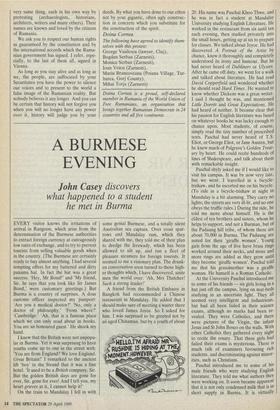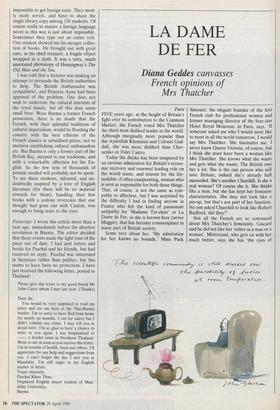A BURMESE EVENING
John Casey discovers
what happened to a student he met in Burma
EVERY visitor knows the irritations of arrival in Rangoon, which arise from the determination of the Burmese authorities to extract foreign currency at outrageously low rates of exchange, and to try to prevent tourists from selling valuable goods when in the country. (The Burmese are certainly ready to buy almost anything. I had several tempting offers for my battered and dirty panama hat. In fact the hat was a great success: 'Hey, Mr Bond!' and 'My friend, Sir, he says that you look like Sir James Bond,' were customary greetings.) But Burma is a country of surprises. A dour customs officer inspected my passport: 'Are you a medical doctor?"No, only a doctor of philosophy.' From where?' 'Cambridge."Ah, that is a famous place which we can only read about in books. You are an honoured guest.' He shook my hand.
I knew that the British were not unpopu- lar in Burma. Yet it was surprising to have youths come up to one in the street with: 'You are from England? We love England. Great Britain!' I remarked to the ancient lift 'boy' in the Strand that it was a fine hotel. 'It used to be a British company, Sir. But the golden British days are gone for ever, Sir, gone for ever! And I tell you, my heart grieves at it, I cannot help it!'
On the train to Mandalay I fell in with some genial Burmese, and a totally silent Australian sea captain. Over roast spar- rows and Mandalay rum, which they shared with me, they told me of their plan to dredge the Irrawady, which has been allowed to silt up, and run a fleet of pleasure steamers for foreign tourists. It seemed to me a visionary plan. The drunk- en conversation soon turned to those high- er thoughts which, I have discovered, unite men the world over: `Ah, Mrs Thatcher! Such a strong leader!'
A friend from the British Embassy in Bangkok had recommended a Chinese restaurant in Mandalay. He added that I should make sure of meeting a waiter there who loved James Joyce. So I asked for him. I was surprised to be greeted not by an aged Chinaman, but by a youth of about 20. His name was Paschal Khoo Thwe; and he was in fact a student at Mandalay University studying English Literature. He worked in the restaurant from six until ten each evening, then studied privately into the small hours, getting up at six to prepare for classes. We talked about Joyce. He had discovered A Portrait of the Artist by chance, knew it thoroughly and completely understood its irony and humour. But he had never heard of Dubliners or Ulysses. After he came off duty, we went for a walk and talked about literature. He had read David Copperfield and wondered whether he should read Hard Times. He wanted to know whether Dickens was a great writer. I said I thought he was, and mentioned Little Dorritt and Great Expectations. He had heard of neither. It became clear that his passion for English literature was based on whatever books he was lucky enough to chance upon. Most students, of course, simply read the tiny number of prescribed texts. Paschal had never heard of T.S. Eliot, or George Eliot, or Jane Austen, but he knew much of Palgrave's Golden Treas- ury by 'heart. He could recite hundreds of lines of Shakespeare, and talk about them with remarkable insight.
Paschal shyly asked me if I would like to visit his campus. It was by now very late, but we went. I travelled in a bicycle- trishaw, and he escorted me on his bicycle. (To ride in a bicycle-trishaw at night in Mandalay'is a bit alarming. They carry no lights; the streets are very and no one obeys the traffic rules.) During the ride, he told me more about himself. He is the eldest of ten brothers and sisters, whom he helps to support, and not a Burman, but of the Padaung hill tribe, of whom there are about 70,000 in Burma. The Padaung are noted for their 'giraffe women'. Young girls from the age of five have brass rings worked around their necks, and more and more rings are added as they grow until they become 'giraffe women'. Paschal told me that his grandmother was a giraffe woman. He himself is a Roman Catholic.
At the University Paschal introduced me to some of his friends — six girls living in a hut just off the campus, lying on mat-beds studying in an uncertain light. They all seemed very intelligent and industrious, but had all been failed in their science exams, although no marks had been re- vealed. They were Catholics, and there were pictures of the Virgin, the infant Jesus and St John Bosco on the walls. With other Catholics they gathered every night to recite the rosary. That these girls had failed their exams is mysterious. There is much talk of examiners favouring rich students, and discriminating against minor- ities, such as Christians. Paschal introduced me to some of his male friends who were studying English literature. They told me what authors they were working on. It soon became apparent that it is not only condensed milk that is in short supply in Burma. It is virtually impossible to get foreign texts. They most- ly study novels, and have to share the single library copy among 150 students. Of course really to master a foreign language novel in this way is just about impossible. Sometimes they type out an entire text. One student showed me his meagre collec- tion of books. He brought out with great care, as his chief treasure, a fragile object wrapped in a cloth. It was a tatty, much annotated photocopy of Hemingway's The Old Man and the Sea.
I was told that a lecturer was making an attempt to persuade the British authorities to help. The British Ambassador was sympathetic, and Princess Anne had been apprised of the problem. One does not wish to underrate the cultural interests of the royal family, but all this does seem small beer. Were Burma a former French possession, there is no doubt that the French, with their splendid traditions of cultural imperialism, would be flooding the country with the best editions of the French classics at subsidised prices, not to mention establishing cultural ambassadors etc. But Burma is only a former part of the British Raj, steeped in our traditions, and with a remarkable affection for the En- glish. So the few tens of thousands of pounds needed will probably not be spent. To see these students, talented, and un- doubtedly inspired by a love of English literature (for there will be no material rewards for them), handling their few books with a jealous reverence that one thought had gone out with Caxton, was enough to bring tears to the eyes.
Postscript: I wrote this article more than a year ago, immediately before the abortive revolution in Burma. The editor decided that those events made the light tone of the piece out of date. I had sent letters and books for Paschal and his friends, but had received no reply. Paschal was interested in literature rather than politics, but this seems to have been no protection. I have just received the following letter, posted in Thailand: Please give this letter to my good friend Mr John Casey whom I met last year. (Thanks)
Dear Sir, You would be very surprised to read my letter and see me here at the Thai-Burma border. I'm so sorry to have fled from home for nearly six months. I ran for safety but I didn't commit any crime. I may tell you in detail later. I'm so glad to have a chance to write to you again. I was hospitalised to , a border town in Northern Thailand. Write to me as soon as you receive this letter. I'm in trouble of health, food and others. I'll appreciate for any help and suggestions from you. I can't forget the day I met you in Mandalay. I'm still eager in my English studies in future.
Yours sincerely, Paschal Khoo Thwe, Displaced English major student of Man- dalay University, Burma



















































 Previous page
Previous page